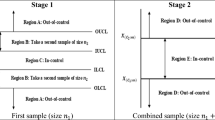Abstract
We define events so as to reduce the number of events and decision variables needed for modeling batch-scheduling problems such as described in [15]. We propose a new MILP formulation based on this concept, defining non-uniform time periods as needed and decision variables that are not time-indexed. It can handle complicated multi-product/multi-stage machine processes, with production lines merging and diverging, and with minimum and maximum batch sizes. We compare it with earlier models and show that it can solve problems with small to medium demands relative to batch sizes in reasonable computer times.
Similar content being viewed by others
References
F. Blömer and H.-O. Günther, Scheduling of a multi-product batch process in the chemical industry, Comput. Indust. 36(3) (1998) 245-259.
R.E. Burkard, T. Fortuna and C.A.J. Hurkens, An event-driven model for chemical batch processes, SFB194, Technical University of Graz (2000).
M. Guignard and S. Wang, An integer programming model for continuous-time batch processing, OPIM Department Report 00-05-02, University of Pennsylvania (May 2000).
M.G. Ierapetritou and C.A. Floudas, Effective continuous-time formulation for short-term scheduling, 1. Multipurpose batch processes, Indust. Engrg. Chem. Res. 37 (1998) 4341-4359.
M.G. Ierapetritou and C.A. Floudas, Effective continuous-time formulation for short-term scheduling, 2. Continuous and semicontinuous processes, Indust. Engrg. Chem. Res. 37 (1998) 4360-4374.
E. Kondili, C.C. Pantelides and R.W.H. Sargent, A general algorithm for short-term scheduling of batch operations-I. MILP formulation, Comput. Chem. Engrg. 17 (1993) 211-227.
X. Lin and C.A. Floudas, Design, synthesis and scheduling of multipurpose batch plants via an effective continuous-time formulation, Comput. Chem. Engrg. 25 (2001) 665-674.
Y.-C. Luo and M. Guignard, A job shop problem in the process industry, OPIM Department Report 97-08-05, University of Pennsylvania (August 1997).
L. Mockus and G.V. Reklaitis, Mathematical programming formulation for scheduling of batch operations based on nonuniform time discretization, Comput. Chem. Engrg. 21 (1997) 1147-1156.
L. Mockus and G. Reklaitis, Bayesian approach to batch process scheduling, Internat. Trans. Oper. Res. 4(1) (1997) 55-65.
H. Qian, Oral communication (November 2000).
S. Wang, Short term scheduling for chemical industries, OPIM Department Summer Research Paper, University of Pennsylvania (August 1998).
S. Wang and M. Guignard, A continuous time model for short term scheduling in batch processing, OPIM Department Report 99-11-01, University of Pennsylvania (November 1999).
S. Wang and M. Guignard, Integer programming approaches for batch sizing and scheduling, OPIM Department Report 01-11-02, University of Pennsylvania (November 2001).
H. Westenberger and J. Kallrath, Formulation of a job shop problem in process industry, Working paper, Bayer AG, Leverkusen and BASF AG, Ludwigshafen, Germany (1994).
Z. Xueya and R.W.H. Sargent, A new unified formulation for process scheduling, in: AIChE Annual Meeting, St. Louis, MO (1993).
H. Yan, M. Guignard, K. Spielberg and Y.C. Luo, A job shop problem in the process industry, in: INFORMS Meeting, Dallas (1997).
M.G. Zentner and G.V. Reklaitis, An interval-based mathematical model for the scheduling of resource-constrained batch chemical processes, in: Proceedings of NATO ASI on Batch Processing Systems Engineering, Antalya, Turkey (1992).
Author information
Authors and Affiliations
Rights and permissions
About this article
Cite this article
Wang, S., Guignard, M. Redefining Event Variables for Efficient Modeling of Continuous-Time Batch Processing. Annals of Operations Research 116, 113–126 (2002). https://doi.org/10.1023/A:1021372029962
Issue Date:
DOI: https://doi.org/10.1023/A:1021372029962




